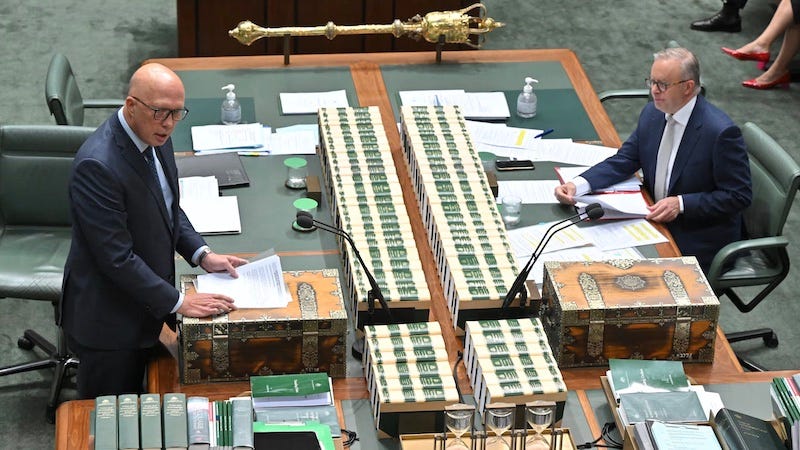Labor’s immigration retreat: Pandering to fear and loathing
Labor’s retreat into the politics of fear and division not only betrays its progressive base but also erodes public trust in the possibility of a more humane and just Australia.
The federal Government’s recent changes to immigration laws, particularly the cap on international students and the lowering of the yearly intake of migrants, are indicative of a broader political strategy that exposes the Albanese government’s inability to dominate a fraught and politically charged policy area. Instead of crafting policies based on evidence and long-term national benefit, the government has allowed itself to be drawn into the Coalition’s well-worn territory of immigration as a proxy for societal anxieties, including housing affordability, labour competition, and cultural identity. This is not simply a case of poor policy; it reflects an ongoing failure of political strategy and a willingness to cede ground to xenophobic narratives promoted by sections of the conservative media and extremists within the electorate.
The decision to restrict international student numbers is particularly perplexing: international education is one of Australia’s largest export sectors, contributing significantly to the economy and fostering cultural and intellectual exchanges that benefit Australian society. These students do not exist in a vacuum; they contribute to the vibrancy and diversity of local communities, participate in the workforce, and often stay on as skilled migrants, filling crucial gaps in sectors ranging from healthcare to engineering. Yet, instead of embracing these values, the Labor government has chosen to frame its policy in a way that panders to populist concerns about “excessive” immigration.
This is the context that has brought the higher education sector to this point: universities, under successive governments, have become dependent on international students as a revenue stream, due to chronic underfunding of domestic higher education. This structural reliance was evident at the start of the Covid pandemic in early 2020, when border closures and international travel restrictions decimated the income of many institutions, leading to staff layoffs and program closures, along with the Coalition government’s refusal to place university casual staff under Jobkeeper support. If any reform of international student numbers was warranted, it should have occurred years ago, based on the need for sustainable university funding models and a balanced approach to education as an export. Instead, the current government’s approach appears reactionary and devoid of coherent long-term planning.
The decision is also undermined by its disingenuous justification. Linking international student numbers to housing affordability or labour shortages ignores the complexity of these issues and provides a false narrative. Housing affordability in Australia is driven by factors such as stagnant wages, restrictive zoning laws, speculative investment, and insufficient government intervention in social and affordable housing. Targeting immigration, whether through student visas or other mechanisms as a solution, is a cynical ploy to deflect from these systemic failures. It is a strategy that plays into the Coalition’s rhetoric, which simplistically positions immigration as a root cause of all societal pressures, despite evidence to the contrary.
Politically, the Coalition’s rejection of the proposed legislation reveals the futility of Labor’s attempt to align itself with conservative positions on immigration. In seeking bipartisan support, the Albanese government has alienated its progressive base while gaining nothing from the Opposition. The Coalition’s rejection was predictable; it allows them to claim that Labor is ineffective in managing immigration while continuing to stoke fears about population growth and cultural displacement. This is a game the Coalition has long played, and by engaging on these terms, Labor has handed them a platform to dominate this debate yet again.
A failure of leadership and vision
The Labor government’s reliance on seeking approval from the Liberal Party – instead of the crossbench – demonstrates an inability to break free from old patterns of political games, at a time when the electoral has become sick and tired of this traditional hyperpartisanship and immature horseplay.
Rather than pursuing meaningful reform or focusing on long-term benefits to the Australian community, the government appears intent on negotiating with an Opposition that has no intention of providing constructive support. This approach not only undermines Labor’s ability to govern effectively but also allows damaging and simplistic narratives around immigration to dominate public discourse.
The proposed cap of 270,000 international students – a reduction of 53,000 from the previous year – highlights the reactive and politically cautious nature of Labor’s policy-making. This figure is only marginally lower than pre-pandemic levels, yet it has drawn predictable condemnation from Peter Dutton and the Coalition. Dutton’s suggestion to lower the cap even further to 160,000, paired with his inflammatory comparison of international students to “modern versions of boat arrivals,” highlights the futility of engaging with the Opposition on this issue. It’s not a matter of finding a compromise; it’s a strategy to paint Labor as weak, ineffective, and complicit in the so-called immigration crisis.
Labor’s persistence in negotiating with the obstructionist Dutton borders on self-sabotage, and appears to forget that his political currency lies in opposing for opposition’s sake. Whether the cap was set at 270,000, 160,000 – or even 50,000 – Dutton’s response would have remained the same: rejection and escalation of rhetoric.
Instead of pandering to a party that thrives on ‘no’, the Albanese government has a viable alternative: the crossbench, which has always offered a potential pathway to implement policies without the need for Liberal Party approval, and engaging in substantive discussions and negotiations, crafting legislation that aligns with the progressive and evidence-based priorities of these parties. Labor could bypass the Opposition entirely, diminishing its relevance in the debate and re-focusing attention on solutions rather than political point-scoring.
The treatment of international students further exposes the structural flaws in Labor’s policy and its approach to governance. Successive governments have allowed universities to treat international students as financial lifelines, extracting exorbitant fees without providing the necessary support for their academic and social integration. Stories of students struggling with advanced academic English requirements, facing inadequate support services, and being left to navigate complex systems with minimal assistance are all too common. Despite the significant revenue international students generate, they are often treated as second-class participants in the education system, with the burden of their challenges falling on overstretched lecturers and tutors.
Capping student numbers without addressing the underlying funding structures of higher education only perpetuates this cycle of instability and exploitation. Targeting international students as scapegoats to these and other problems in society does nothing to address these root causes; it merely diverts attention and reinforces xenophobic sentiments.
A race to the bottom in cruelty and political expediency
The Albanese government’s introduction of draconian asylum seeker policies, including the deportation and surveillance conditions in the Migration Amendment bill, signals a distressing escalation in Australia’s already hardline approach to refugees. This legislation, which allows the government to designate any nation as an offshore detention site, strip legal protections from asylum seekers, and revoke permanent protection visas, is a betrayal of the principles Australia claims to uphold under the United Nations 1951 Refugee Convention. By enabling the forced deportation of vulnerable individuals to countries where their safety cannot be guaranteed, the bill is indicative of the race to the bottom in Australian politics on asylum seeker issues – a race where cruelty has become the defining metric of success.
The bill is part of a broader pattern in which successive Australian governments, both the Coalition and Labor, have treated asylum seekers not as human beings but as political liabilities. For decades, policies have been crafted not to address humanitarian concerns or to manage migration effectively but to placate a xenophobic minority within the electorate and to put pressure on political opponents. Labor’s willingness to introduce legislation even more punitive than that envisioned by the Coalition demonstrates how deeply entrenched this approach has become. In seeking to avoid accusations of being “soft on refugees,” Labor has not only adopted quite a large section from Coalition’s playbook but is writing new chapters of its own.
Australia’s asylum seeker policies over the past quarter-century have reflected a profound moral failure, rooted in political expediency. From the Howard-era Pacific Solution to the offshore processing arrangements in Papua New Guinea and Nauru, and now to the deportation powers bill, the common thread has been a willingness to dehumanise those fleeing persecution. The arguments used to justify these measures – that Australia faces a potential influx of “millions” of asylum seekers if it relaxes its policies – are based on fearmongering rather than evidence. The geographical realities of reaching Australia make such scenarios impossible, and the relatively small number of asylum seekers who do arrive should be well within the capacity of a wealthy, G20 nation to manage humanely.
Instead, Australian governments have consistently opted for policies that are cruel because cruelty is perceived as an effective deterrent. This reasoning, however, ignores the desperation that drives people to seek refuge in the first place. The journey to Australia, often fraught with danger, is not undertaken lightly. For someone fleeing war, persecution, or systemic injustice, the decision to risk everything is a last resort. To meet such courage and desperation with policies designed to strip away dignity and hope is an indictment of Australia’s political class and its failure to lead with compassion.
Labor’s approach to asylum seekers, like its immigration and international student policies, reflects a deeper malaise: the inability to resist the gravitational pull of political games and posturing. By framing asylum seekers as threats and imposing ever more punitive policies, Labor not only legitimises the Coalition’s narrative but also ensures that future governments – remembering that the Coalition will return to office at some point – will take these measures to even greater extremes. The result is a vicious cycle in which bipartisan cruelty becomes the norm, and genuine reform becomes increasingly unthinkable.
The media has also played a significant role in shaping and sustaining this dynamic. Many sections of the mainstream media have long favoured simplistic narratives that equate toughness with competence and humanitarianism with weakness. These outlets thrive on the portrayal of asylum seekers as invaders, cultural disruptors, or economic burdens, reducing complex human stories to inflammatory headlines. In this environment, governments find it easier to craft policies that appeal to fear and prejudice than to challenge the narrative with facts and empathy.
Australia’s hardline stance on asylum seekers is particularly egregious given the scale of the global refugee crisis. Countries with far fewer resources and far greater internal challenges, such as Lebanon, Jordan, and Bangladesh, host millions of refugees. In contrast, Australia’s contributions, both in terms of resettlement and financial aid, are minimal. The argument that Australia cannot afford to take in more refugees is not only disingenuous but also an affront to the values of fairness and egalitarianism that the nation purports to hold dear.
The deportation and surveillance powers bill is a symptom of a broader political pathology: the prioritisation of short-term political gains over long-term ethical governance. Labor’s retreat into the politics of fear and division not only betrays its progressive base but also erodes public trust in the possibility of a more humane and just Australia. At its core, the failure to treat asylum seekers with dignity reflects a deeper societal malaise – the triumph of the easy, cruel solutions over the hard, courageous decisions that improve the lives of all.
This is a forlorn hope but Labor should have the courage to lead with principles, to challenge the media narratives that reduce asylum seekers to political pawns, and to articulate a vision of Australia as a nation that upholds the fair go for everyone, regardless of where they come from. Anything less is a betrayal not only of the refugees who seek Australia’s protection but also of the country Labor claims to represent.










